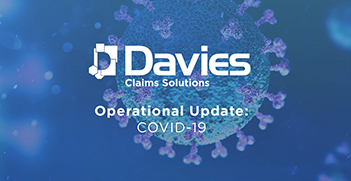A perfect storm for fraudulent claims
13th July 2020

Fraud thrives during difficult economic times and claims handlers need to pay special attention and prepare for a spike in suspicious claims stemming from the COVID-19 pandemic.
COVID-19 has impacted the lives of individuals unlike any other event in the living memory. History has proven that times of economic crisis see a huge increase in insurance fraud across most lines of business. As with any major catastrophe, fraudsters will be looking for new ways to cash in.
According to the Association of British Insurers (ABI), the recession of 2008 saw a total of 107,200 false insurance claims worth £730 million. This was a 17% increase compared to the previous year, when fraudulent claims totaled £560 million.
“When the country becomes economically stressed, so do people. The lines between right and wrong are easily blurred” said Ahmed Esat, Head of Investigations at Davies Group. “The need to raise cash as a business or private household may prove to be a strong motivator for insurance fraud.”
While a great spike hasn’t manifested at this point, Esat believes there will be heightened risk of fraud through to the end of 2020 and well into 2021 as we ease out of lockdown. All industry professionals involved in claims handling will need to be aware of the potential for fraudulent activity and ensure that the counter-fraud antennae is switched on and applied at all times. However, Esat says proportionality is vitally important. Most claims will be genuine and counter-fraud mechanisms need to work seamlessly with expedient claims handling.
Domestic property claims
“Some opportunists may stage insurance claims completely while others may be tempted to take advantage of genuine claims and exaggerate their losses in the hope that claims handlers will not have time scrutinise claims as thoroughly because of distractions, or because insurers fear adverse publicity,” said Esat.
With lockdown and social distancing measures becoming increasingly relaxed as of late, Esat says it creates the potential for dubious accidental loss claims, often for jewellery and personal effects of substantial value. Whilst the opportunity for fabricating such a loss during the most restrictive stages of the lockdown was limited, the risk of fictitious claims in this scenario is growing.
With schools closed and individuals being furloughed or working from home, it also creates a perfect storm for accidents. An increase in DIY projects during this period is also a linked factor.
Commercial property claims
Esat is also predicting a spike in fraudulent activity in the commercial space; a repeat of what happened post-recession in 2008.
“Businesses who have had pandemic-related claims such as business interruption rejected may be tempted to respond by staging or exaggerating claims in the same climate as the opportunists, but driven by a sense of injustice. Scenarios include businesses reopening with redundant or obsolete stock and machinery or misrepresenting their pre-pandemic financial position.” Esat said.
Businesses may be tempted to misrepresent their pre-pandemic financial position, even going as far as to provide fabricated documentation. Esat says that “due diligence in this regard is critical to identifying suspicious claims. Whilst asset rich, many businesses will be cash deprived”.
Mitigating risk
Challenges presented by the COVID-19 pandemic include the inability to deploy an adjuster to site. Where one might usually go into a home or business to deal with a claim, Esat says adjusters have increasingly relied on video technology but phone or video interviews may fail to elicit the usual physical traits of a suspicious insured and lack the spontaneity of a usual meeting. These added challenges mean insurance professionals need to put extra effort into doing their due diligence and truly understand the profile of the individual, including potential motivators of fraud.
“Look for behavioral indicators, for example, if a policyholder is resistant to the claims validation process or applying an unnecessary level of pressure for settlement,” says Esat. “They may rely on social distancing restrictions to prevent insurers from fully validating or investigating claims.”
Modern technology is increasingly a weapon against fraudsters. At Davies Group, Esat’s team of investigators use a tailored video interview platform which facilitates screen sharing, discreet bookmarking and three-way interviews, allowing investigators to operate efficiently and effectively throughout the lockdown.
Social media is also a key element in the fight against fraud especially with increased activity during the lockdown, as relevant business and personal information is easily accessible.
In addition, Esat represents Davies Group on a number of entities, including the Chartered Institute of Loss Adjusters (CILA) Anti-Fraud Special Interest Group (SIG) where members can discuss fraud matters of mutual interest and COVID-19-related trends.
“Cross-industry collaboration and intelligence sharing will be key to identifying and disrupting new fraud threats as early as possible and to minimize the harm they cause,” said Esat.
Insurers have not been immune to impact from the coronavirus either and are even more vulnerable to fraud as offices were fragmented into a work from home structure. The sharing of information as well as the normal checks, balances and controls may be stretched without the normal infrastructures in place, he added, but Davies Group continues to operate at a high level to ensure the usual counter processes are adhered to through engagement and collaboration with claims handlers and adjusters.
“Training plays a big role in ensuring that long established fraud identification processes are followed and raising awareness levels in regard to the threats posed by the COVID-19 pandemic and the potential drivers and motivators arising from the impact on livelihoods,” he said. “Remote training delivered through video technology, underpinned by case discussions and reviews has replaced the inter office discussions of old.”
Related Articles
-
- Article
- Claims Solutions
Claims Solutions update in the UK & the Republic of Ireland
Davies and COVID-19 – Claims Handling – Business as usual Over…
-
- Acquisition
- Article
- Claims Solutions
Davies deepens its claims expertise through the acquisition of Thornton Group in Ireland
Davies today announces the acquisition of Thornton Group (“Thornton”). Based in…
-
- Article
- Technology
3 Tips to Ensure your Customer Due Diligence Process is Client Friendly
To meet your KYC and AML obligations, you need to carry…
-
- Acquisition
- Article
- Claims Solutions
Acquisition announcement: Davies adds to its specialist motor claims capability with acquisition of GBB Holdings
Davies today announces the acquisition of GBB Holdings incorporating specialist forensic…



